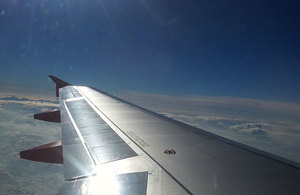Aruba, Bonaire, St Eustatius and Saba, Chile, Qatar, Madeira and the Azores removed from travel corridor list
People returning to the UK from these locations will need to self-isolate for 10 days.

- Aruba, Bonaire, St Eustatius and Saba, and Qatar have been removed from list of travel corridors for England from 4am on 16 January 2021, following data showing a significant increase in confirmed cases
- we will also be removing Chile, Madeira and the Azores from the travel corridor list for the UK from 4am on 15 January 2021, due to their strong travel links with Brazil
- there will be no additions to the list of travel corridors
- travellers are urged to check the latest advice from the Foreign, Commonwealth & Development Office (FCDO) before travelling and will be required to fill in a passenger locator form before returning home
Aruba, Bonaire, St Eustatius and Saba, and Qatar have been removed from England’s list of travel corridors, following a significant increase in confirmed coronavirus (COVID-19) cases in these countries.
Chile, Madeira and the Azores will also be removed from the travel corridors list as part of the government’s response to the Brazilian strain of the virus. This comes alongside the urgent decision to ban travel to the UK from several South American destinations, Portugal, Panama and Cape Verde in order to prevent the spread of the new strain into the UK.
From 4am on Friday 15 January 2021, only British and Irish nationals, and third country nationals with residence rights traveling to the UK from Chile, Madeira and the Azores will be allowed entry. They will still need to self-isolate for 10 days along with their households.
From 4am on Saturday 16 January 2021, people returning to the UK from Aruba, Bonaire, St Eustatius and Saba, and Qatar will also need to self-isolate for 10 days upon arrival.
People currently in Aruba, Bonaire, St Eustatius and Saba, Chile, Qatar, Madeira and the Azores are encouraged to follow the local rules, return home as normal and check FCDO travel advice for further information.
At the same time, the FCDO has updated its travel advice to advise against all but essential travel to Aruba, Bonaire, St Eustatius and Saba, Chile, Qatar, the Azores and Madeira.
The government has always said it will take decisive action, if necessary, to contain the virus, including if the public health risk of people returning from a particular country without self-isolating becomes too high.
National restrictions for England introduced on 6 January 2021 remain in place, meaning everyone must stay at home unless travelling for a very limited set of reasons, including for work. This means people can no longer travel to take holidays or travel internationally unless for work or other legally permitted reasons. Those in breach of the rules face penalties starting at £200, rising to a maximum of £6,400.
From 4am on Monday 18 January 2021, passengers from all destinations will also be required to present a negative COVID-19 test result before travelling to England to help protect against new strains of coronavirus circulating internationally and to identify those that may currently be infectious.